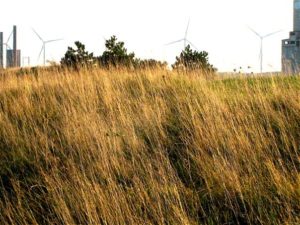Silo City and Tifft Nature Preserve are essentially tied together by the Buffalo River. But there are other things that tie the two sites together, despite one being known for its industrial legacy, and the other being known for its vital ecosystems.
At one point in time, both of these waterfront locations were subjected to the harshness of industry, which polluted the lands and the waters. The Tifft site – once farming land, even became a dumping ground, before it transitioned to a nature preserve.
For years, a number of organizations have been fighting to restore the Tifft lands, and their surroundings, which is why similar restoration efforts at Silo City are so imperative. These lands are linked together, forming the upland areas of the wetland, which is one of the most productive ecological geographic areas in all of WNY, according to Maris Grundy (Director of Education at Lyceum at Silo City).
As a way to get additional traction, restoring the wetlands by eradicating invasive plant species and planting indigenous species, Grundy has helped to build a team that has organized a series of Urban Ecological Restoration Workshops. Other team members include Zach Woodrich (steward at Tifft Nature Preserve), Priscilla Titus (ecologist), and Joshua Smith (Diretor of Ecology at Rigidized Metals/Silo City). The restoration workshops are thanks to a Greenway Grant, which is intended to help maintain a sense of natural balance for plants and animals, while protecting the sensitive water filtrating lands that have been subjected to so much abuse over the years.
The abuse has come from industry, of course. But it has also come at the hands of invasive species that include phragmites, common and glossy buckthorn, and Japanese knotweed. Once these invasive plants are removed, the native species return, which helps to restore the lands that are inhabited by all sorts of wildlife that is indigenous to WNY.
“One of the reasons that the workshops are so important is that they teach people in an experiential way,” said Grundy. “People will tell us, ‘You’re cutting things down!’ – the signage that we put up isn’t as effective as the hands-on workshops that teach people what’s taking place. The restoration workshop is a half day – from 9am to 1pm. We start in the morning at Tifft, doing restoration planting. It’s a great way for people to learn the importance of the different plants, and the effective strategies. Then, we head over to Silo City where people get to see the greenhouse (hoop house). It’s a native plant nursery, with tens of thousands of plants. The greenhouse grows for Tifft, and Silo City, but it also grows for a number of other places in Buffalo.”
Grundy told me that the workshops offer a very baseline experience for people, whether they are looking to get involved with ecological organizations and efforts, or they are simply backyard gardeners. It’s a lesson on how to propagate native plants, identify invasive species, and a general overview of regional restoration efforts.
“The majority of people that have attended the workshops so far are students that want to get their hands dirty, artists who work with landscapes, and people who are interested in social and environmental justice,” said Grundy. “Rick Smith (Silo City and Rigidized Metal Works) imagined this being an experiential way to get people involved, outside of the university setting. The non-profit was launched in 2018. We’re just starting to get things going again since the pandemic. This is peripatetic walking and learning (hence the name Lyceum) – a number of our events involve poetry, photography, and ecology. Next year we hope to organize a week-long ecology conference.”
For those who are interested in learning about the real Buffalo – the behind the scenes efforts that are being made to restore waterfront lands, and beyond, these workshops are very beneficial. Not only will they teach people about their connection to the planet, they will also give insight into the history of Buffalo, as a natural treasure that has been compromised, yet is now rebounding.
To register for one of the workshops (see below), email marisgrundy@gmail.com. All of the information and workshop details will be emailed back to the participants, prior to the events.
The post Urban Ecological Restoration Workshops @ Tifft Nature Preserve & Silo City appeared first on Buffalo Rising.

